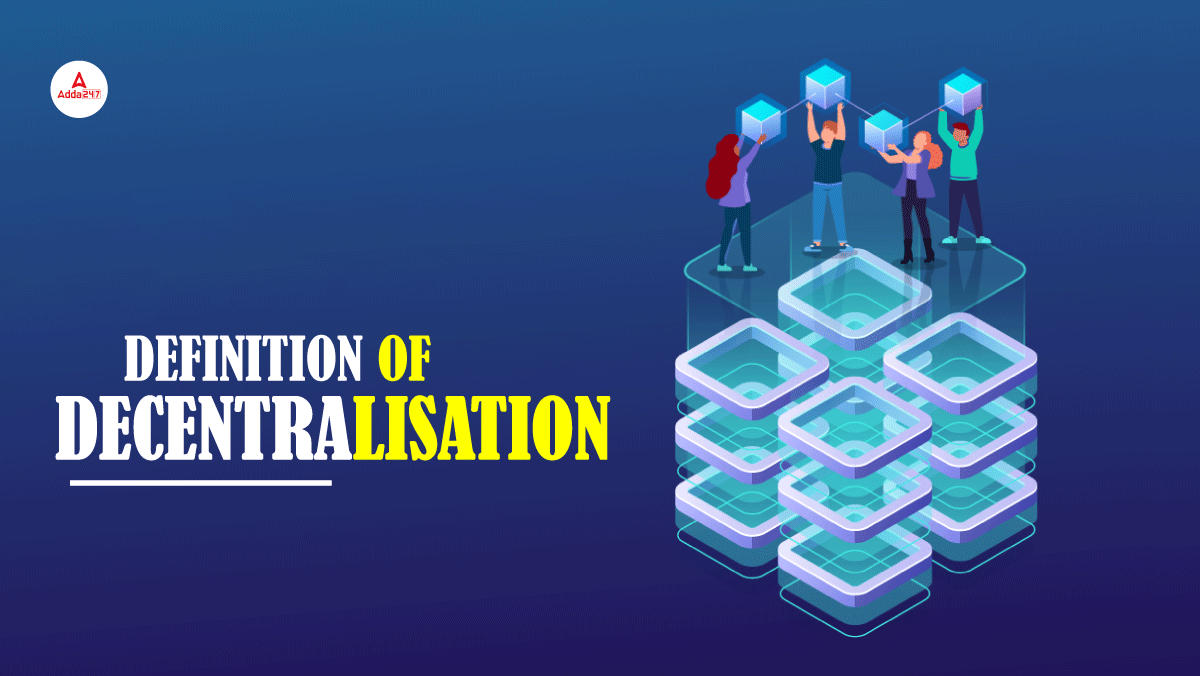Table of Contents
Decentralisation, a critical concept in governance and business, refers to the distribution of decision-making authority from a Central body to lower or regional levels of an organisation or government. This process empowers local units or departments with the responsibility to make day-to-day decisions, allowing for greater operational flexibility and faster responses to local needs. With its roots in democratic and administrative theories, decentralisation aims to balance power across different levels of an organisation, thus ensuring efficient functioning. In this article, we explore the importance, types, advantages, disadvantages, and case studies of decentralisation, with a particular focus on its implementation in Indian States.
Importance of Decentralisation
Decentralisation plays a crucial role in promoting efficiency and accountability at lower levels of management and governance. Some key reasons why decentralisation is essential include:
- Accelerated Decision-Making: Since lower levels are empowered to make decisions without needing approval from the top, decentralisation ensures that actions can be taken quickly, enhancing the organisation’s ability to adapt to changing circumstances.
- Managerial Development: It offers opportunities for the development of leadership and decision-making skills among middle and lower-level managers. As they take on more responsibility, they gain experience, improving their future prospects within the organisation.
- Enhancing Local Governance: In a political context, decentralisation brings governance closer to the people, allowing for localised policies that better reflect the needs of the population. This is particularly relevant in the context of India, where decentralisation is crucial for ensuring effective governance across its vast geographical and cultural diversity.
- Empowerment and Accountability: By distributing responsibilities to local units, decentralisation fosters a sense of ownership and accountability, encouraging departments or local governments to strive for excellence.
Advantages of Decentralisation
The decentralisation of power within an organisation or government provides numerous advantages:
- Promotes Flexibility: Local branches or departments are better equipped to make decisions tailored to the specific needs of their communities or functions, enabling a flexible response to challenges.
- Encourages Innovation: By giving individuals and departments more freedom to make decisions, decentralisation fosters a culture of innovation and experimentation.
- Relieves Top Management: Decentralisation allows senior management or government to focus on strategic, high-level decisions, rather than being bogged down by daily operational issues.
- Improved Communication: A decentralised structure often results in better communication between management levels and faster information flow, which improves responsiveness to local challenges.
Disadvantages of Decentralisation
Despite its benefits, decentralisation comes with its own set of challenges:
- Coordination Issues: Different branches or departments may take conflicting approaches, leading to a lack of coherence in decision-making. Coordination among various units can be difficult and may result in inefficiencies.
- Duplication of Efforts: Without proper oversight, decentralised units may end up duplicating efforts or resources, leading to wastage and inefficiency.
- Loss of Uniformity: In some cases, decentralisation can lead to inconsistencies in policies, procedures, and standards across different units, making it harder to maintain a unified organisational culture or governance approach.
- Risk of Corruption: Decentralisation may create opportunities for corruption at the local level, especially if accountability measures are weak.
Types of Decentralisation
In India, decentralisation manifests in several forms, often influenced by Constitutional amendments and local governance laws:
- Democratic Decentralisation: This form involves transferring power from Central government to State and local governments, such as Panchayati Raj institutions. The 73rd and 74th Constitutional Amendments played a significant role in establishing local governance through Panchayats and Municipalities, empowering citizens to participate in decision-making.
- Administrative Decentralisation: Here, powers related to administrative decision-making are transferred to lower levels of government. This may include deconcentration, where tasks are distributed within government departments, and devolution, where local authorities are given broader powers and responsibilities.
- Fiscal Decentralisation: This involves devolving financial powers, such as the ability to collect taxes or allocate funds, to local governments. Local bodies in India, like Panchayats and Municipalities, often receive financial grants and are given authority over local taxation.
Case Studies of Decentralisation in Indian States
- Kerala: Known for its successful implementation of decentralisation, Kerala’s “People’s Plan” allowed local bodies significant autonomy in decision-making, particularly in education, health, and infrastructure development. This model of participatory governance has been praised for its effectiveness and inclusiveness.
- Rajasthan: The State has taken steps to transfer significant administrative control to Panchayats, including devolving departments such as health and education. This has empowered local governments and improved service delivery in rural areas.
- Odisha: With the introduction of a 50% reservation for women in local bodies, Odisha has demonstrated how decentralisation can improve political participation and representation.
Challenges and Solutions in Implementing Decentralisation
Despite its promise, implementing decentralisation in India faces challenges such as insufficient funding, lack of trained personnel, and resistance from entrenched centralised authorities. To overcome these, some suggested solutions include:
- Strengthening Financial Autonomy: Ensuring local bodies have adequate funds through increased local taxation powers and targeted grants from Central and State governments.
- Capacity Building: Training local officials to handle new responsibilities effectively, thereby enhancing governance at the grassroots level.
- Accountability Mechanisms: Establishing clear checks and balances, such as regular audits and transparency measures, to prevent misuse of power and ensure that decentralisation leads to improved governance.
Conclusion
Decentralisation empowers local governance and management by distributing decision-making authority, leading to faster, more effective operations and enhanced accountability. While it promotes innovation and local responsiveness, its success depends on addressing challenges like resource allocation and coordination. In India, decentralisation offers the potential for more inclusive governance, but requires continued efforts in capacity building and transparency to truly transform local development and decision-making processes.



 TSPSC Group 1 Question Paper 2024, Downl...
TSPSC Group 1 Question Paper 2024, Downl...
 TSPSC Group 1 Answer key 2024 Out, Downl...
TSPSC Group 1 Answer key 2024 Out, Downl...
 UPSC Prelims 2024 Question Paper, Downlo...
UPSC Prelims 2024 Question Paper, Downlo...




